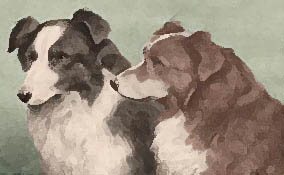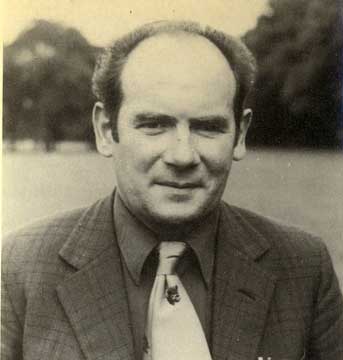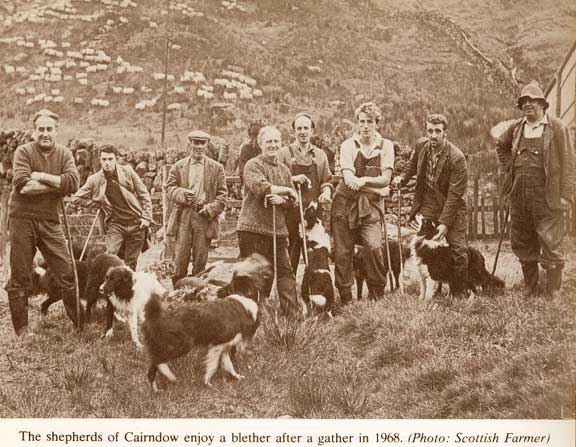

![]()
MATT MUNDELL
1936 - ca. 1990

Matt Mundell (photo by Gordon Wright).
Matt Mundell was brought up on his family's farm in Annan, Dumfriesshire, Scotland. He left school in 1951 to go into journalism. He began work at The Scottish Farmer, a national farming newspaper and magazine in 1955, and then, after a stint working with Reuters in Fleet Street (London), Mundell returned to Scotland in 1965 to work once again for The Scottish Farmer as a roving reporter.
During his tenure with The Scottish Farmer he spent fourteen years visiting all corners of Britain gathering material for his articles; and to other countries as well in search of their shepherds' tales. Some of these were eventually assembled for a book, Country Diary, published in 1981 by Gordon Wright Publishing, Edinburgh (dissolved as of 2012). In the preface to Country Diary, Mundell said:
Stravaiging homewards many a night through hill glens in the winter of 1965-66 after I had rejoined The Scottish Farmer, the winking lights in upland farm and cottage windows worried me. They meant, almost certainly, that families were seated round the television.
At these same firesites many years before, there were cheerier times, as in the glow from the hearth, the tales and legends of the glens, their people and their stock were handed down through the generations.
I determined then, that each winter I would rake the sheep country and seek out the worthies and retell their yarns...and pass on to others an account of their thoughts, their deeds, their work, their sorrows and their successes...
Mundell's own knowledge of country life was extensive, and he interviewed drovers, shepherds, mill workers, shearers, craftsmen, sheepdog breeders and handlers, and even a poet. However, he had a particular afinity for shepherds' dogs, and most of the book is filled with stories of shepherds and their dogs.

Photo from Country Diary
About three hours after a ton of collies had been loosed in a flurry of freedom at the mountain bottom, the glen-side began to bleed white. Another day in the Cairndow gather was well under way.
Where scores of burns came splattering through gully and bracken down to the tourist route west, between 650 and 700 Blackfaces were steered in a river to the glen floor, ringed by hill men and their dogs. Nine men, maybe thrity-odd collies.
Ernie MacPherson and Archie Campbell had cleaned the tops of sheep at the back of the mountains. Old hand Jimmy Waddell and Donald Beaton had taken some of the weight of the ever-enlarging flock along the bottom. Between them, coming from eather side, seven others with brown dog, blue merle, beardie and hunter had tidied up the face and the rocks leaving Lechdain's three mile stretch denuded of stock...
There can be trials and toils before the eleven hirsels on Cairndow yield their crops for the annual sale in the Achadunan farm shed. Cairndow's mighty spread, at that time covering around 22,000 acres and stocked with three to four thousand breeding ewes, could be gathered in thirteen days for the sale...if all went well.
This was far from guaranteed. There are mists which can curl into the glen and frustratingly hang around for days or weeks or just come and go. Men can be on some of the 3,000 ft high tops and look down on it. Useless gathering weather...
Thirteen days could do for Cairndow's gather in...peak tmes. But mostly it could be anything up to six weeks before all the lambs were eventually gatherered, drawn and put in the lowground fields beside the River Fyne to await sale day. A hirsel a day was good going...If pushed, the cheery squad could hie out and take in two hirsels a day...The toughest they covered meant five or six hours on the mountains before parking a thousand head of ewes and lambs into the fanks.
I chose this quote from a chapter called "The Long Gather" because I witnessed such a scene, on a much, much smaller scale, one day when my husband and I were staying on a working-hill-farm-cum-bed-and-breakfast in Scotland, and it was thrilling to see. But this one: 22,000 acres, three to four thousand sheep, a 3,000 foot mountain, 30-odd dogs, and only 9 men!
Writing in The Scottish Farmer: One Hundred Years, Angus MacDonald said of Matt Mundell that he made "a considerable impact on agricultural writing...as a countryside feature-writer and book author", and this appears to be true.
There is a chapter on the International Sheep Dog Trial ("The Blue Riband"), and one on famous working sheepdogs ("Dogs of Legend"). Mundell's love of the working sheepdog brought him to publish a monthly mimeographed newsletter called Scottish Sheepdog Handler from 1970 to 1977. It was the first of it's kind and the forerunner of subsequent working sheepdog newsletters such as Working Sheepdog News (published from1978 to 1985 by Sheila Grew, published from 1985-1989 by Barbara Collins, published from 1989-1996 by Delia Sturgeon, and finally published from 1996 to 2002 by Pauline and Andrew Hall); Outrun (published by Roy Goutté); and International Sheepdog News, the magazine of the International Sheep Dog Society (published by Pauline and Andrew Hall).
Matt Mundell also covered sheepdog trials in the USA, New Zealand and Canada, and he was a trials judge himself in Scotland. His knowledge and understanding of what made an excellent working sheepdog brought him to co-author a book with the great John Templeton, Working Sheep Dogs, Management and Training in 1988 (Crowood Press, Wiltshire). It is a great pity that more information on Matt Mundell does not seem to exist.
THE OTHER WEB PAGES WE MAINTAIN
These web pages are copyright ©2013
and maintained by webmeistress Carole Presberg
with technical help from webwizard David Presberg
ALL RIGHTS RESERVED
If you are interested in using ANY material on this website, you MUST first ask for permission.